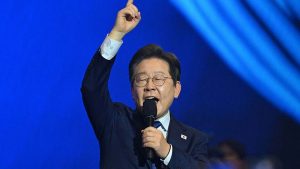Korean Challenge

The people of South Korea have shown their maturity as votaries of democracy by recently gifting a landslide victory to presidential candidate Lee Jae-myung of the Democratic Party of Korea (DPK) who won the polls securing 49.42 per cent of the vote with a total voter turnout of 79.38 per cent. Lee assumes power with a solid popular mandate and comfortable control of the National Assembly. The election has brought to a close the period of uncertainty that began following a 6-month constitutional and political crisis stemming from former President Yoon Suk Yeol’s short-lived imposition of martial law and subsequent impeachment. The victory marks a tremendous political comeback for Lee, who narrowly lost the previous presidential election by a mere 0.7 per cent to the now disgraced Yoon. Lee was at one point mired in five ongoing legal cases, one of which had put in doubt his eligibility to run for this election until the Constitutional Court’s decision in late March in his favour. His win means the return to office of progressive political forces in South Korea that last held power in 2022. The transition, however, poses challenges for Lee as he has to tackle an unenviable backlog of domestic and foreign policy issues. Lee Jae-myung has an interesting political background. He is the leader of the progressive DPK, a former National Assembly member and a two-time presidential candidate. He was mayor of Seongnam, governor of Gyeonggi Province. His rise to power culminating in his victory in the presidential election is a remarkable achievement for someone who grew up in a slum, south of Seoul, dropped out of middle school to work in sweatshops and worked as a human rights lawyer and labour activist for two decades before entering politics in 2005. It is almost a rags to riches story that places him in a unique position to understand the problems of the common man, the poor and also big wigs of industry. He faces one of the most daunting challenges of any South Korean president since Kim Dae-jung was elected to office in the midst of Korea’s liquidity crisis in 1997. In South Korea’s financial crisis of 2004, recovery from the economic downturns relied on China’s economic boom. In 2017, the country bounced back because of the South Korean semiconductor export boom. But no such favourable factors exist today. On the contrary, Lee now has to deal with problems arising out of the ongoing war in Ukraine and Gaza, US tariffs, Chinese export controls and North Korea-Russia relations. All of these militate against South Korea’s economic recovery. The Bank of Korea recently cut the 2025 growth forecast by almost half (from 1.5 per cent to 0.8 per cent). Furthermore, the global trade war between United States and China, Korea’s two most important trading partners, has begun to hurt the Korean export-led economy, with total global exports and car exports down 1.3 per cent and 4.4 per cent respectively last month. Korean exports to the United States and China have been hit even harder, with each falling by about 8 per cent last month. The interim government that preceded Lee made no progress in addressing problems emanating from the bevy of Trump tariffs, including the 10 per cent baseline tariffs, 25 per cent auto tariffs, 25 per cent auto parts tariffs and 25 per cent tariffs on imports from Mexico. South Korean trade negotiators under the interim government failed at winning tariff exemptions. With about a month before the 90-day tariff pause ends on 8 July, President Lee will find himself with little to no time to spare before tackling the most important task of his early presidency: reaching a deal with US President Donald Trump. As Lee wants to project South Korea as a staunch supporter of an alliance with the United States, he may have a favourable response from President Trump on issues such as tariffs, potential troop withdrawals and the US’ North Korea policy. The two are scheduled to meet on the sidelines of the ongoing G-7 summit. At the same time, he has already declared he is not averse to improving relations with Japan and China. His balancing act with respect to China may force Trump to drag cold feet. On the whole, Lee would have a lot on his plate in the coming months to steer his country out of the current crises, be it domestic or global.
News